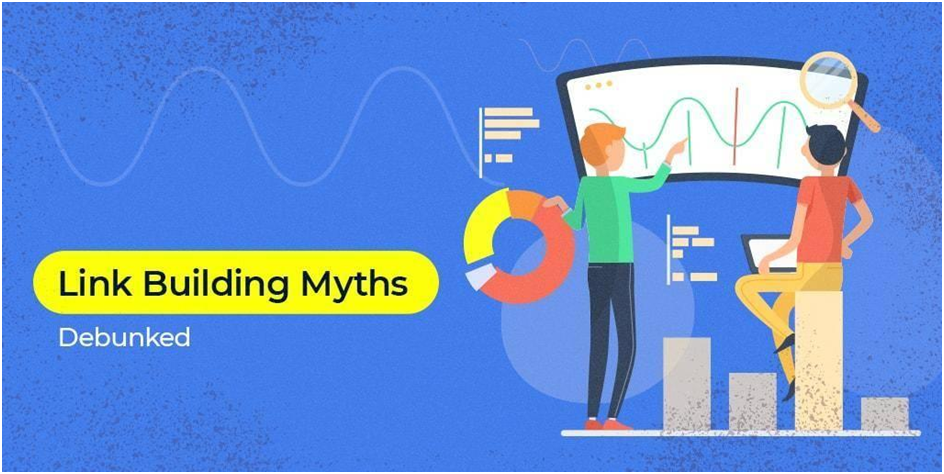Link Building Myths: Debunking Common Misconceptions

Link building is a cornerstone of search engine optimization (SEO), yet it’s shrouded in myths and misunderstandings that often mislead marketers. To craft an effective strategy, it’s essential to separate fact from fiction and focus on tactics that genuinely work. Let’s explore and debunk some of the most common link-building myths while shedding light on proven approaches.
Myth 1: More Links Always Mean Better Rankings
The Reality:
Quantity doesn’t guarantee quality in link building. While links are a ranking factor, search engines prioritize the relevance, authority, and trustworthiness of the sites linking to your content. A single link from a highly authoritative website can outweigh dozens from low-quality sources.
What Works:
Focus on acquiring links from reputable sites within your niche. Create valuable, shareable content that attracts natural backlinks from trusted sources. Quality over quantity should always be your mantra.
Myth 2: Link Building is Dead
The Reality:
This myth stems from updates like Google Penguin, which penalized manipulative link schemes. While link spamming is obsolete, link building remains crucial for SEO success. Google’s algorithms continue to rely on links to assess site authority and relevance.
What Works:
Adopt ethical link-building practices. Engage in outreach campaigns, collaborate with industry influencers, and provide value through guest posts and high-quality resources.
Myth 3: Reciprocal Linking is Harmful
The Reality:
Reciprocal linking (exchanging links between two websites) isn’t inherently harmful. It becomes problematic when overused or done with irrelevant or low-quality websites. Search engines penalize manipulative schemes, not genuine partnerships.
What Works:
Maintain balance in your reciprocal linking strategy. Only exchange links with sites that provide real value to your audience and align with your industry.
Myth 4: Anchor Text Optimization is a Game-Changer
The Reality:
While anchor text optimization is important, over-optimization can backfire. Google penalizes websites that use exact-match keywords excessively in their anchor texts, as it signals manipulative practices.
What Works:
Use a natural mix of anchor texts. Include branded terms, generic phrases, and natural language that fits the context. The goal is to prioritize user experience and readability.
Myth 5: Social Media Links Boost SEO Rankings Directly
The Reality:
Social media links are typically “no-follow,” meaning they don’t directly contribute to SEO rankings. However, they play an indirect role by increasing content visibility and driving traffic.
What Works:
Leverage social media to amplify your content, attract engagement, and encourage natural backlinks from authoritative sites. Social media is a supporting player in your link-building strategy.
Myth 6: Guest Blogging is Ineffective
The Reality:
Guest blogging is often misunderstood due to its misuse as a spammy tactic. When done correctly, it remains a powerful way to build relationships, showcase expertise, and gain valuable backlinks.
What Works:
Target reputable sites in your niche. Provide high-quality, original content that offers value to their audience. Avoid mass guest posting on irrelevant or low-quality sites.
Myth 7: Directory Submissions are Obsolete
The Reality:
Not all directory submissions are worthless. High-quality, niche-specific directories still hold value, especially for local SEO. The key is discerning valuable directories from spammy ones.
What Works:
Focus on submitting to credible, industry-relevant directories. Examples include business listings, local directories, and authoritative niche-specific platforms.
Myth 8: You Shouldn’t Link to Competitors
The Reality:
Linking to competitors isn’t necessarily detrimental. Outbound links to authoritative and relevant content—competitor or not—can enhance your site’s credibility.
What Works:
Use outbound links strategically to improve user experience. Link to high-quality resources that support your content, even if they belong to competitors.
Myth 9: Paid Links Always Result in Penalties
The Reality:
Paid links aren’t inherently harmful if disclosed properly. Issues arise when paid links are used deceptively to manipulate rankings, violating search engine guidelines.
What Works:
If you invest in paid partnerships, ensure transparency by using proper disclosures and “no-follow” tags. Focus on collaborations that prioritize user value over SEO shortcuts.
Myth 10: Internal Links Don’t Impact SEO
The Reality:
Internal links are an essential part of SEO strategy. They help search engines understand site structure and distribute link equity. Ignoring internal linking means missing opportunities to enhance site navigation and rankings.
What Works:
Optimize internal links by connecting related pages and using descriptive anchor texts. This enhances the user journey and helps search engines discover your content.
Myth 11: All Links are Equal
The Reality:
Not all backlinks carry the same weight. Links from spammy or irrelevant websites can harm your rankings, while those from authoritative, relevant sites significantly boost your credibility.
What Works:
Regularly audit your backlink profile. Disavow harmful links and focus on building relationships with trusted sources to earn high-quality links.
Myth 12: Link Building is a One-Time Task
The Reality:
SEO and link building are ongoing processes. Search engines constantly update their algorithms, and your competitors are always improving their strategies.
What Works:
Continuously monitor your backlink profile, refresh your link-building efforts, and adapt to industry trends. A proactive approach ensures sustained success.
Myth 13: Exact-Match Domains Automatically Build Links
The Reality:
Exact-match domains (EMDs) may provide some initial advantage, but they don’t guarantee backlinks or rankings. Content quality and relevance still reign supreme.
What Works:
Build a strong foundation with valuable content and user-focused design. Earn backlinks through your site’s merit, not its domain name.
Final Thoughts
Link building, when done right, remains an indispensable part of any SEO strategy. Dispelling these myths allows marketers to focus on ethical, effective tactics that drive long-term success. By prioritizing quality over shortcuts and staying aligned with search engine guidelines, you can harness the true potential of link building.
Remember, SEO is a marathon, not a sprint—embrace strategies that provide sustainable results over time.





